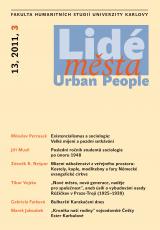Bulharští Karakačani dnes
DOI:
https://doi.org/10.14712/12128112.3547Klíčová slova:
nationalism, sedentarization, adaptation, ethnicity, identification, social organizationAbstrakt
During the second half of the 20th century, nomadic Balkan shepherds known as Karakachans became fully sedentary. They mainly settled in cities, where they were forced to adapt their lifestyles, family organization, and ways of communication. Although they do not show any ethnic emancipation activity, they remain a clearly bordered population in the eye of the majority, against which a social distance is maintained. This study represents the ethnography of sedentary Karakachans in contemporary Bulgaria. Special attention is paid to subsistence and housing strategies, marriage patterns, social status of Karakachans in Bulgarian society, ways of communicating with the majority, and ways of group identification. The issue of Karakachan identification is analyzed with respect to recent theories of nationalism and ethnicity. The aim of this study is to describe recent Karakachan way of life in the broad context of the world it is adapting to.
Stahování
Publikováno
Jak citovat
Číslo
Sekce
Licence

Tato práce je licencována pod Mezinárodní licencí Creative Commons Attribution-NonCommercial-NoDerivatives 4.0.


